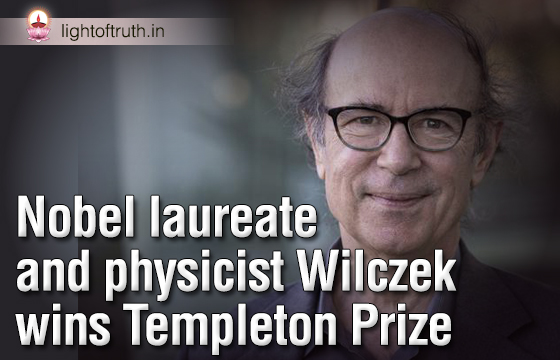Azadi ka Amrit Mahotsav Kolkata event honours four Clergymen
Pope Francis asks businesses to support working women: They’re ‘afraid to get pregnant’
Study: Christianity may lose majority, plurality status in U.S. by 2070
Indian politician declines Magsaysay Award under party pressure
Like John Paul II, Pope Francis heads to Kazakhstan during time of war

Frank Wilczek, the Nobel Prize-winning theoretical physicist and author renowned for his boundary-pushing investigations into the fundamental laws of nature, was honored Wednesday with this year’s prestigious Templeton Prize, awarded to individuals whose life’s work embodies a fusion of science and spirituality.
In a statement, the John Templeton Foundation praised the 70-year-old Wilczek for transforming “our understanding of the forces that govern our universe,” while also applying “the insights of his field to the great questions of meaning and purpose pondered by generations of religious thinkers.”
Established in 1972 by the late philanthropist Sir John Templeton, the prize is one of the world’s most lucrative individual awards, currently more than $1.3 million. Past winners include Jane Goodall, Mother Teresa, the Dalai Lama and Archbishop Desmond Tutu.
“It’s encouragement in a direction that I’ve really only taken up in a big way quite recently, although I’ve been building up to it for many years,” he said, “which is thinking about not just what the world is and how it came to be this way but what we should do about it.”
Over a long career, Wilczek has recorded many distinguished achievements. That includes the 2004 Nobel Prize in Physics, along with David J. Gross, and H. David Politzer, for their 1973 breakthrough explaining the unusual properties of the strong force, which binds fundamental particles known as quarks into protons and neutrons.
He has also authored several books that are informed by science but delve into the spiritual and philosophical. They include “ A Beautiful Question,” in which he asks, “Does the universe embody beautiful ideas?”; “ The Lightness of Being,” an examination of what humans are made of; and “ Fundamentals,” an exploration of radical life ex-tension, the longing for immortality, the limits of science and other topics.
“In studying how the world works, we are studying how God works, and thereby learning what God is,” he writes in “Fundamentals,” released this year. “In that spirit, we can interpret the search for knowledge as a form of worship, and our discoveries as revelations.”
Growing up Catholic, he embraced the idea that there was a grand plan behind existence. But as he learned more about science, he eventually lost faith in conventional religion and, in his words, “jettisoned detailed dogmas.”
Leave a Comment